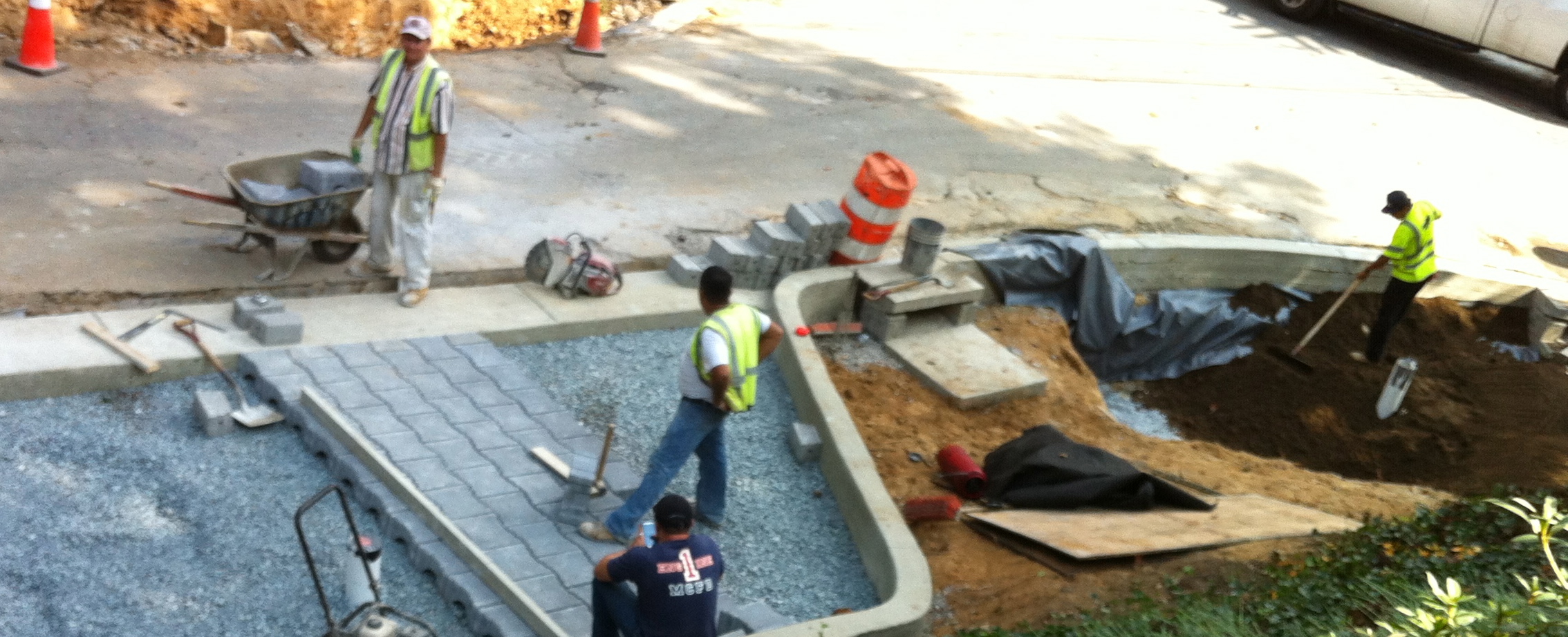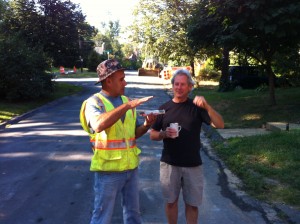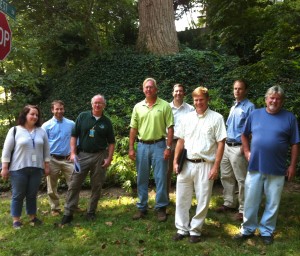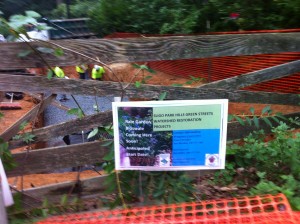
Sligo Hills Stormwater Project (Video)
I can hear them arrive in the deep quiet of predawn. Car doors closing. Occasional shouted greetings.
Minutes later, the Storm Water Project construction crew brings in the noise, as earth movers, bulldozers, trucks and other thunderous vehicles move into place. The grinding, beeping, pinging and rumbling begins. Take a look and listen for yourself in this video:
For the last two weeks a construction crew has worked in front of my house to install a filtration system to clean and slow the storm water that wreaks havoc on the Anacostia Tributary System, the Chesapeake Bay – and the roads in Sligo Park Hills.
When it rains in this neighborhood, the runoff uproots big chunks of the street. The chunks disintegrate and are joined by herbicides, silt, pesticides and fertilizer, all heading for Sligo Creek in the park below. The creek is one of many that feed into the tributary system.
Under this onslaught, the roads in Sligo Park Hills seems, at times, to be falling apart. The result for local residents has been an eternal and ever increasing round of potholes. At one point, the situation was bad enough for the Montgomery County, MD Department of Transportation (DOT) to send pothole repair trucks through the area once a week.
Heated by the elements, this polluted water is an even bigger problem for those who love the Eastern Seaboard. Asphalt, combined with the other detritus from throughout the region, is routinely heated by the elements and pushed by current and gravity toward the Atlantic Ocean.
An easy answer for Montgomery County officials might have been to continue repairing potholes, or to replace the road altogether. We all could have counted on our fingers the minutes a solution like that might last.
Encouraged by neighborhood activists, the county’s departments of Environmental Protection (DEP) and Transportation joined with a civil engineering firm to figure out how best to slow, capture and clean the water before it gets to Sligo Creek. The resulting plan uses county property (the land between the street and yours) to create rain gardens, pervious parking pads, tree boxes, bio-swales and bio-retention areas.
For examples and explanations of these proposed solutions, click here: http://www.montgomerycountymd.gov/dot-dte/Resources/Files/Sligo.pdf
The project is funded by DEP, DOT, a grant from the Chesapeake and Atlantic Coastal Bays Trust – and the storm water fee portion of our property taxes. It’s part of the county’s plan to meet Federal and State mandates to reduce pollution from storm water runoff.
Sligo Park Hills is one of 15 county neighborhoods now taking small steps toward a more permanent solution to a huge environmental problem. It’s not been an easy path. There have been missteps. There were delays. Eyebrows were raised at the calculated loss of some pretty trees and a troubling perception that construction will narrow already constricted streets.
In a neighborhood with no sidewalks, roads here are the main thoroughfares for pedestrians and cyclists alike. We push strollers, ride bikes and walk dogs in the streets. Some worry that with the addition of very distinct curbs, there’s nowhere for pedestrians and peddlers to quickly escape any speeding cars. (Thankfully, there are relatively few speeders in my part of the neighborhood.)
Construction Supervisor Manuel Brito works on the project’s front line. Arriving each morning with his crew, he’s quite often the first to hear from concerned residents. He, however, takes all in stride. “We try to work with everyone, he says, between directing laden trucks, forklifts, workmen and local traffic. Brito heads the crew for the general contractor on site, D & F Construction Company, Inc.
I admit I was initially very upset when I found out that the two trees and several large forsythias on county property in front of my house would be chopped down. I may even have thrown a tantrum. When a neighbor volunteered to take the forsythias and hold them until other homeowners in the area came to claim them, she watched as Brito’s bulldozer operator lifted each bush delicately from the ground and deposited it gently on her property.
But the county also responded admirably. They sent a team of experts, including an arborist, to talk to me about the bushes and trees I would lose.Long before the construction crew showed up, the county held a number of public meetings. Plans were drawn, red lined and redrawn. Utility company crews located and marked gas lines and other underground obstacles. Residents were talked through the process. Depending upon project demands, homeowners were offered a choice between rain gardens or pervious parking pads. Some project plans were then adjusted again. It’s an ongoing process.
Then, the county posted signs announcing construction start dates on property in front of homes slated to receive a storm water solutions. Now, although the project is now well underway, I’m sure the county, project managers, and the construction crew continue to remain flexible.The trees in the right of way of my yard are gone now, along with part of one azalea and some decades old forsythia bushes. Already, the trench in front of my house has been partially filled with rain garden soil and special water filtering gear. Ultimately, I’ll have a parking pad on one side of my property and a rain garden on the other. And, when the entire project is finished, the streets in Sligo Park Hills will be resurfaced.
I did what I could to get over myself. The construction machinery brings in the noise, but that’s a small price to pay to help clean up the Bay. However, I’ll be truly happy when the early morning grinding, beeping, pinging and rumbling, stops.






This captures the skepticism and mixed feelings of many Sligo Park Hills neighbors when the stormwater project began. It’s a great explanation of what’s going on, and ends on such a positive note. We are pretty lucky here in Sligo Park Hills!
Yes, Fran, we are lucky in Sligo Park Hills!
I love “Storm Water Construction Symphony” I am next door to a lot with an office building going up I think the “music/noise is a variation of your symphony definitely not my idea of enjoyable.
Thanks Elaine. Not enjoyable, but sometimes unavoidable. Hang in there!
Glad you are posting these great stories. Missed you.
I love Elaines remarks about the Construction symphony!!! Very interesting article. It will be all worth waitng for smiles…